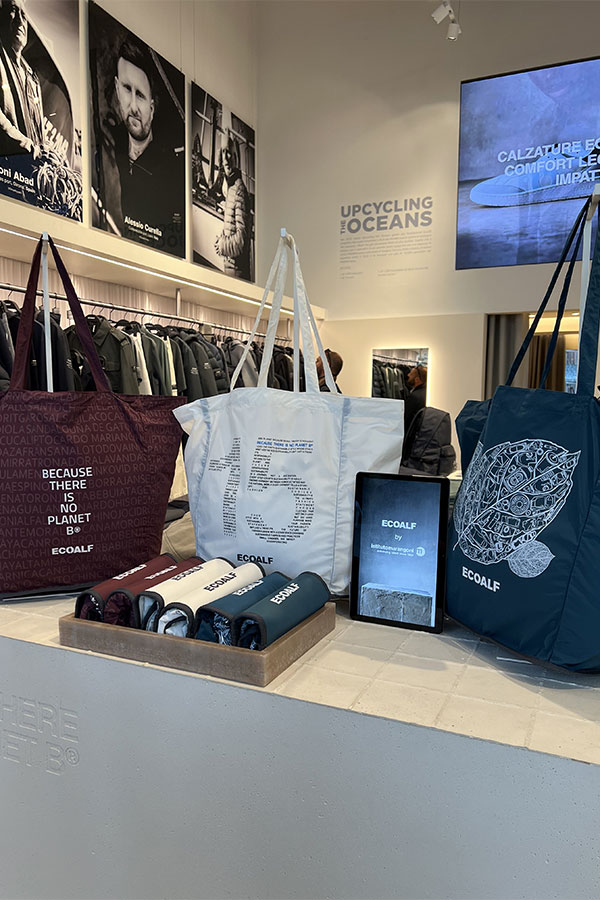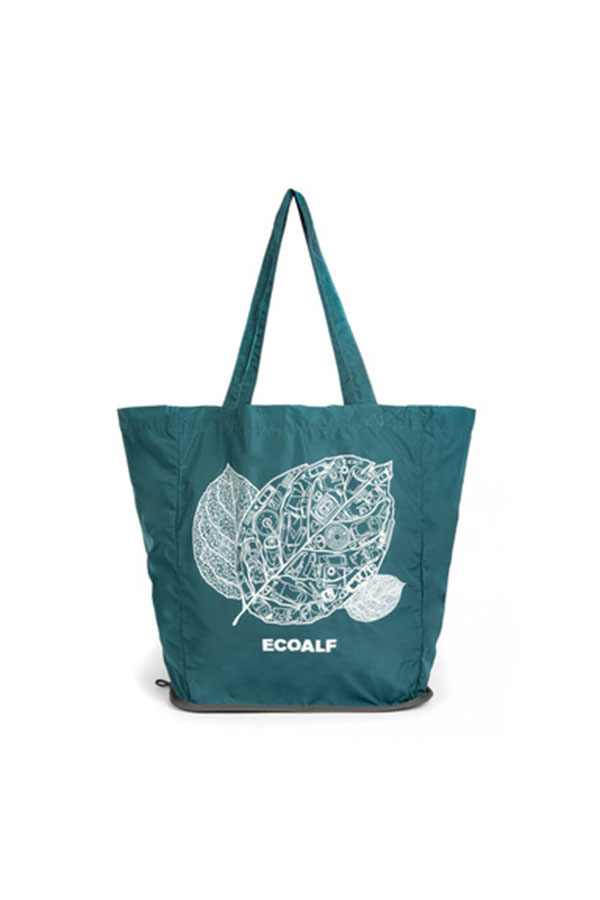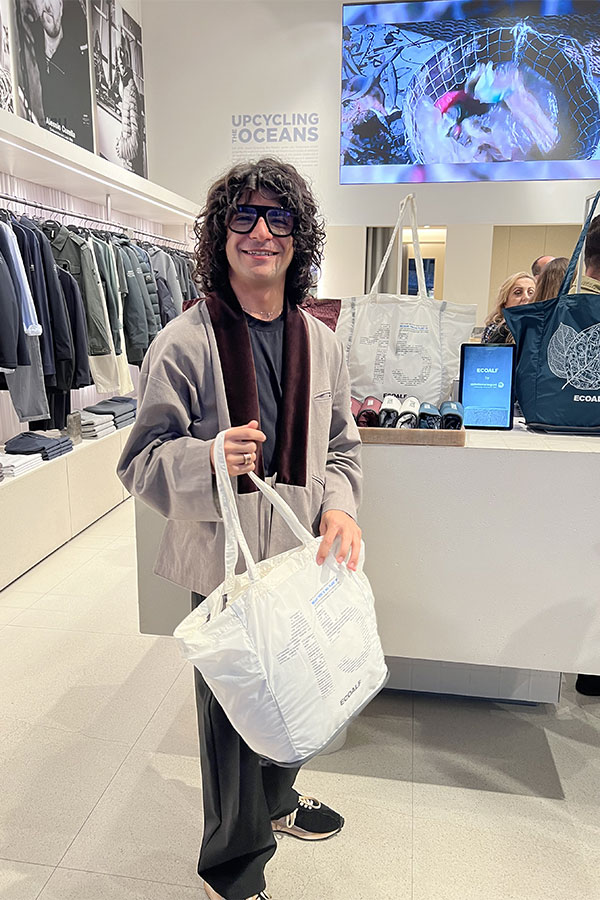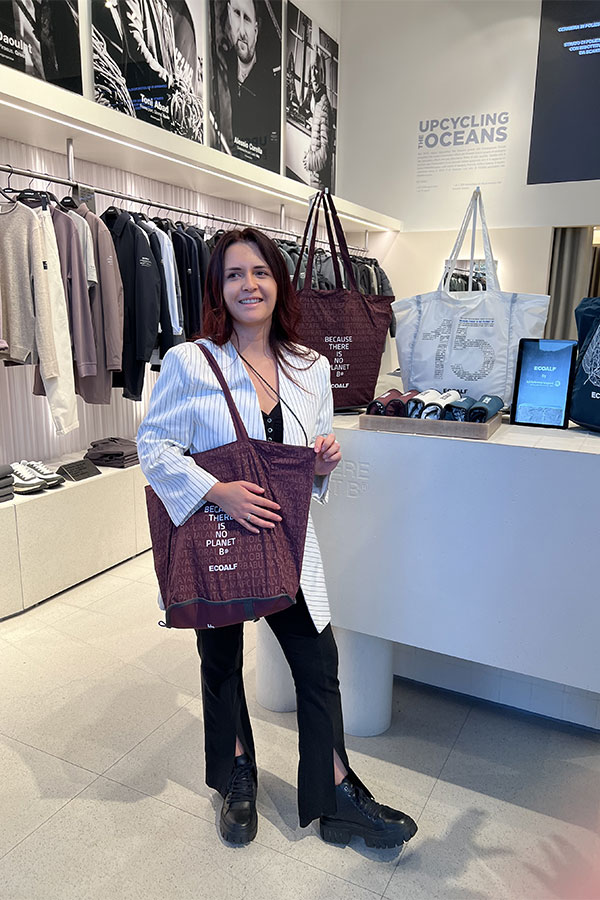






Ecoalf celebrates its 15th anniversary by teaming up with Istituto Marangoni's I'M Alumni community to create a capsule collection of "Because There Is No Planet B®" shopping bags
If sustainability is important to you in fashion and across multiple sectors, you’re likely part of the younger generation. Analysts agree that Gen Z and younger Millennials embrace fully sustainable brands and are wary of “greenwashing”, sometimes proudly influencing the shopping habits of older friends, parents, and relatives.
But where can you shop responsibly? In recent years, numerous brands have emerged with a focus on sustainability, openly and transparently sharing their practices with the public. The range of materials and techniques available today is remarkably diverse—from plastic bottles and fishing nets to corn waste. Yes, you read that correctly—corn waste! This innovative material has brought to life the creative visions of three Istituto Marangoni alumni who collaborated with Ecoalf, one of Europe’s most sustainable B-Corp brands. These designers reinterpreted the company’s trademarked slogan, “Because there is no Planet B®”, in a limited edition of tote bags crafted from upcycled fabrics.

Ecoalf celebrates its 15th anniversary by teaming up with Istituto Marangoni's I'M Alumni community to create a capsule collection of "Because There Is No Planet B®" shopping bags
So, how did things unfold? To celebrate its 15th anniversary, the Spanish brand teamed up with the international school to launch a contest for the I’M Alumni community, sparking ideas for lifestyle change. Three winners had their creative designs printed on Ecoalf’s sustainable tote bags.
But what does “There is no such thing as Planet B®” truly mean for these emerging designers? More than just a slogan, Ecoalf’s claim is a global movement that has already united over a million people committed to protecting the Earth. It encourages us all to make more ethical choices in every aspect of our lives.
Why Ecoalf is the Responsible Brand We Need
If you’re constantly searching for new sustainable brands, Ecoalf is one you should definitely learn more about.
Visualizza questo post su Instagram
Founded in Spain in 2009 by Javier Goyeneche following the birth of his two sons, Alfredo and Álvaro, Ecoalf’s mission has had a clear mission from the beginning: to create a truly sustainable fashion brand that prevents the depletion of the planet’s natural resources by using recycled materials, without sacrificing quality or design.
Sustainable Contests? Just Ask Ecoalf and Three Rising Istituto Marangoni Designers
“We want to educate future generations and promote a sustainable lifestyle by avoiding any plastic that will end up as waste,” said Ecoalf, when they launched a unique contest with Istituto Marangoni aimed at the I’M Alumni community.
After receiving numerous submissions and crowning three winners, Ecoalf made sure that their creative designs were turned into a limited-edition, sustainable tote bag collection. The aim was to present them in the brand’s stores in Milan, Madrid, Paris, and Barcelona. We attended the Italian launch of this collaboration and had the opportunity to chat with the young fashion designers from Istituto Marangoni. We asked them all about the concept of “There is no such thing as Planet B®” that inspired their work.
Ghazal Amrollahi – “One Leaf, One Bag, One Planet”
Ghazal Amrollahi, a BA Fashion Design alumna, was eager to share her unique experience during this project. Let’s delve into her creation.

"One Leaf, One Bag, One Planet" is the slogan behind the shopper bag designed by Ghazal Amrollahi, a BA Fashion Design alumna from Istituto Marangoni, for the collaborative project with Ecoalf
What inspired you for this project?
The inspiration came from the fragile relationship between humanity and nature and the pressing need to restore balance before it’s too late. I was moved by the concept of how a single leaf, once vibrant but now burdened by human waste, can serve as a powerful symbol. It represents both the fragility of our ecosystems and the potential for renewal if we take action now.
“My design is not just about aesthetics, but about using art to communicate a deeper message of change” – Ghazal Amrollahi, Istituto Marangoni BA Fashion Design alumna
Can you tell us more about the process of making a bag from corn waste and recycled polyester?
The process begins with the collection of corn waste, a by-product of the agricultural industry. Instead of letting it go to waste, it is repurposed into a biodegradable material that is used in the fabric for the bag. Recycled polyester, on the other hand, is made from post-consumer plastic waste, such as bottles, which are collected, cleaned, and broken down into fibres. These fibres are then spun into threads and woven into durable, high-quality fabric. This process demonstrates how fashion can be both innovative and responsible without compromising on style or quality.
What does sustainability mean to you?
For me, sustainability is not just a practice or trend; it’s a fundamental philosophy that shapes how we interact with the planet and its resources. It’s about redefining true value and beauty and ensuring that the Earth’s ecosystems are preserved and nurtured for future generations.
Gian Marco Caggiari – “Sustainability Starts with Human Resources”
Gian Marco Caggiari, a BA Fashion Design & Accessories alumnus, shared some valuable insights.

Gian Marco Caggiari, a BA Fashion Design & Accessories alumnus from Istituto Marangoni and winner of the Ecoalf contest
What inspired your creative design for Ecoalf’s tote bag?
I drew inspiration from various sources. The number 15 on the bag stands for Ecoalf’s 15th anniversary. The wording within the number emphasises key elements in the creation of the tote, such as the use of corn waste and recycled polyester.
“It’s essential not to confine sustainability to just nature; it should also encompass the human element” – Gian Marco Caggiari, Istituto Marangoni BA Fashion Design & Accessories alumnus
What’s your creative process like?
Creativity can sometimes lead to chaos, so it’s crucial to bring order by starting with key concepts and then refining them through selection or by combining multiple elements.
What does sustainability mean to you?
Sustainability isn’t just about the environment; it should also encompass the human aspect, ensuring dignified working conditions and fostering a truly sustainable environment.
Paula Aguilera – “Rediscovering the Power of Our Five Senses”
Paula Aguilera, a BA Fashion Design alumna from Istituto Marangoni, highlighted the importance of our five senses.

Paula Aguilera, a BA Fashion Design alumna from Istituto Marangoni and winner of the Ecoalf contest
What inspired you?
My inspiration came from reading “The Five Senses” by philosopher Michel Serres. The book emphasises how we’ve become overly reliant on learning through printed words while neglecting our other senses.
“Ecoalf is deeply aware of contemporary global issues, turning this awareness into fuel for sustainable action” – Paula Aguilera, Istituto Marangoni BA Fashion Design alumna
How did your creative design evolve from the “There is no such thing as Planet B®” claim?
I incorporated the names of plants that have been historically used for healing. These plants are still used in some communities today but have largely been forgotten. I did this to encourage us to reconnect with our senses—smell, taste, touch, and hearing. Inspired by this idea, I also created a book using rice printing techniques, which is a creative departure from traditional books.
Lucrezia Spina
Editor



